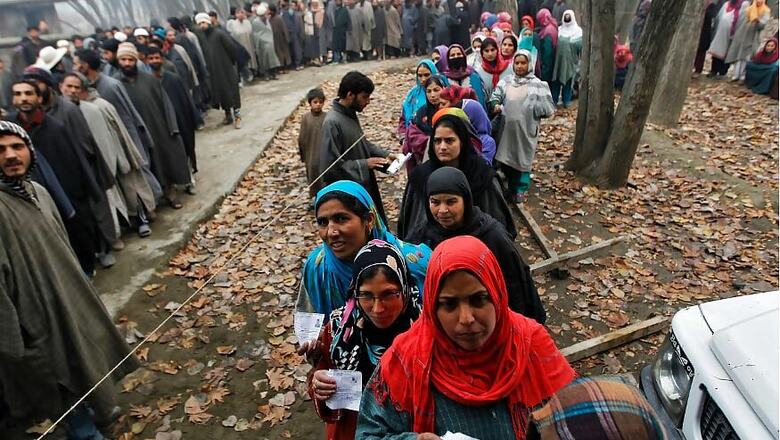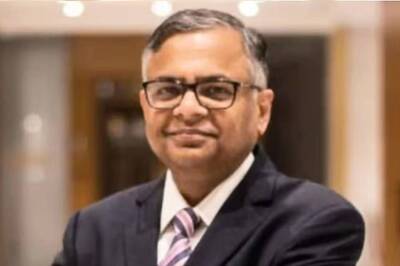
views
It is spring and Srinagar, the nerve centre of the revolt in Kashmir, will be expected to be draped in vibrant colours; its streets, perhaps, lathered with election paraphernalia — the direst imaginings of fiction in a land where reality harps on a turbulent history.
The city, however, will remain sullen. A high alert will be in force. Military checkpoints will dot the landscape for security reasons. And 12,90,318 voters will break their heads whether to come out or not and vote in 1,716 polling stations set up in the constituency.
Majority of them won't. For them, it’s an easy decision. Always has been.
In Kashmir, elections are neither about the arithmetic nor the caste calculation. Even alliances, the downright political franchise of this poll season, don’t matter there. Alliances are forged to save faltering political parties and individual careers; in Kashmir, no such things exist. There are no uncharted territories to conquer. It’s monopoly all the way, from one election season to the other, and electoral politics, more often than not, hinges on soft-separatism. The political vacuum — alarming and ever so prevalent — persists. The representative contention between mainstream politicians and separatists remains the day’s narrative.
In fact, what eventually matters is that if people come out and vote. And that — some might tell you otherwise — happens very rarely. That’s why, in Srinagar, the summer capital of the restive state which is going to polls in the second phase, all eyes will be on the voter turnout rather than who clinches the seat.
In 2017, Srinagar witnessed a 7.14 per cent voter turnout during the parliamentary bypolls, the lowest in the last three decades. The day was marred by violent protests across the constituency. Eight people, mostly school-going youth, were killed. Controversy also erupted when an army major tied up a protester to the front of his jeep to be used as a human-shield against stone-pelters.
Four days later, a re-poll in 38 polling booths ordered by the Election Commission of India witnessed 2 per cent polling, bringing the total turnout in the constituency further down by 0.01 per cent. The final voter turnout in Srinagar was 7.13 per cent. That means that on an average only one person out of 10 came out to vote.
That year, the Jammu and Kashmir National Conference (JKNC) managed to wrest the seat from People’s Democratic Party (PDP) candidate Tariq Hameed Karra, who had quit the party and the Lok Sabha in 2016 and joined Congress, leaving the seat vacant. Kara had won the seat in 2014 with a vote share of 50.6 per cent. JKNC’s Farooq Abdullah had got 30.7 per cent of the vote share.
Jammu and Kashmir sends just six members to Parliament. Yet, the Kashmir situation is dominating national discourse today and setting the agenda for various political parties. With Farooq Abdullah contesting from Srinagar this time around as well, the controversy over the special constitutional position of Jammu and Kashmir has become the central issue in this election, after the Bharatiya Janata Party (BJP) announced that it would scrap Articles 370 and 35A.
But mainstream parties in the Valley have long been at the end of public ire, with voter trust plunging to its lowest and street anger rising, almost exponentially.
Faced with rejection for ‘collaborating’ with the Centre and the armed forces, mainstream political leaders have often found it hard to step out and campaign. In Srinagar, this gets all the more tough, barring certain pockets where people come and vote; almost like a drip of an intravenous injection forced painfully into a patient’s vein.
Yet, Srinagar might witness a triangular contest after a very long time between Farooq Abdullah, Irfan Ansari of the Peoples Conference, and Agha Mohsin of the PDP. Abdullah, the 81-year-old NC patriarch and the ninth oldest sitting Lok Sabha member (as on October 2017), is holding an edge over his rivals. But with Peoples Conference too in the fray this time, one could witness a tight race to the finish.
Peoples Conference is led by Sajad Lone, a former ally of the BJP.
Another important issue which the political parties are harping on this time around is the Public Safety Act (PSA), one of the forms of administrative detention, ostensibly enacted by Sheikh Abdullah in 1978 to originally take action against the timber mafia, which now allows preventive detention for people against whom there may be no recognised criminal offence. It provides for detention for a maximum of two years in the case of persons acting in any manner.
According to the 2010 Amnesty report ‘A Lawless Law: Detentions Under the Public Safety Act‘, at least 10,000-20,000 people have been detained under this preventive detention law since it was enacted in the 1970s.
Abdullah’s grandson, and the former chief minister of Jammu and Kashmir, Omar Abdullah, has promised to scrap the PSA. This, party insiders believe, will help them garner some youth votes. But the impact of election boycott is expected to be huge. Separatist leaders, who have called for a boycott of the polls, hold considerable sway over many segments of Srinagar and the recent rise in militancy in the city, will further prevent people from coming out to vote.
The city is also reeling from the memories of last year when the summer capital woke up to a gut-wrenching video of a youth, Adil Ahmad Yadoo, being mowed down by an armed forces vehicle. The aftershocks of the killings were felt in the 2018 municipal polls too when local polling booth in Chattabal — Yadoo’s hometown — registered zero turnout.
Srinagar constituency comprises the Srinagar district along with the districts of Ganderbal and Budgam in central Kashmir. All three districts have seen a large scale discontent and clashes since 2014, with several encounters taking place in the areas after a long lull.
Ganderbal’s Muhammad Rafi Bhat, an assistant professor at Kashmir University, was killed in May last year just a day after he joined the militants in south Kashmir. In Budgam, too, scores of militants — local and foreign — have been killed in last three years.
Known for a moderate turnout, Budgam’s turnout during 2017 parliamentary bypolls was a mere 8.82 per cent — a 30 per cent decrease over the voter turnout the area witnessed during 2014 Lok Sabha polls.
The constituency of Srinagar in itself has a history of poor turnouts — with just 25.55% in 2009 and 25.86% in 2014. The constituency had witnessed a voter turnout of 11.93 per cent in 1999, the fifth lowest poll percentage in the country’s electoral history.
Yet, the low voter turnout is expected to favour the loyal vote base of JKNC’s Farooq Abdullah. The party patron is among the very few mainstream leaders in Kashmir who still has his traditional vote bank intact in all the three districts of Srinagar, Ganderbal and Budgam. In addition to that, the nomadic Gujjar community, who comprise a significant vote bank in the city outskirts and around Ganderbal, have remained loyal to the party throughout the years.
Interestingly though, this time the contest in Srinagar might also see a sectarian electoral clash. The PDP has fielded Aga Syed Mohsin, a Shia Muslim who contested the 2014 polls as an Independent candidate. During the 2014 Lok Sabha polls, Mohsin had only bagged 16,000 votes. Now a member of the PDP, which is facing an existential crisis in the Valley after most of its important leaders jumped ship in the wake of PDP-BJP split last year, Mohsin has been given an uphill task to swing the elections for the party. He is expected to divide the Shia votes between the PDP and Peoples Conference Shia candidate Irfan Ansari, brother of the former PDP MLA Imran Ansari.
Another important party in the fray this time around is the Peoples Conference. Headquartered in north Kashmir, PC officially entered Srinagar politics during the municipal polls last year. The civic body polls were boycotted by the NC and the PDP, which meant that Peoples Conference won many municipal seats easily. The party’s leader, Junaid Azim Mattu, is currently serving as the mayor of Srinagar. Mattu has long been in the news for focusing in the areas of Srinagar outskirts and the interiors of Dal Lake where the impact of poll boycott has often remained less.
As Srinagar goes to polls, what, however, remains to be seen is that if the city, scarred and wounded due to conflict, will again find itself embroiled in violence.




















Comments
0 comment